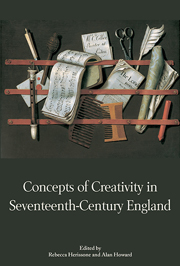Book contents
- Frontmatter
- Contents
- List of Illustrations
- List of Contributors
- Preface
- Introduction
- Creating to Order: Patronage and the Creative Act
- Creative Identity and the Role of Print Media
- Mapping Knowledge: The Visual Representation of Ideas
- Authorial Identity
- 7 Telling what is Told: Originality and Repetition in Rubens's English Works
- 8 Plagiarism at the Academy of Ancient Music: A Case Study in Authorship, Style and Judgement
- Imitation and Arrangement
- The Performer as Creator
- Bibliography
- Index
8 - Plagiarism at the Academy of Ancient Music: A Case Study in Authorship, Style and Judgement
from Authorial Identity
Published online by Cambridge University Press: 05 March 2014
- Frontmatter
- Contents
- List of Illustrations
- List of Contributors
- Preface
- Introduction
- Creating to Order: Patronage and the Creative Act
- Creative Identity and the Role of Print Media
- Mapping Knowledge: The Visual Representation of Ideas
- Authorial Identity
- 7 Telling what is Told: Originality and Repetition in Rubens's English Works
- 8 Plagiarism at the Academy of Ancient Music: A Case Study in Authorship, Style and Judgement
- Imitation and Arrangement
- The Performer as Creator
- Bibliography
- Index
Summary
Authorship is not merely a facet of the creative process: it also shapes the reception of a text, artwork or musical composition. For audiences or readers, knowledge of an author's identity is a means to recognize and classify pieces of literature, art and music. The author's name shapes evaluative discourse about his or her works, carrying connotations of value and prestige. Already in the sixteenth century, the names of some authors carried such power that audiences might suspend their judgement. Such a situation was described in Baldassare Castiglione's Il Cortegiano of 1528:
Every one of us here, have many times, and do even now, give more Credit to the Opinion of others, than our own: As a Proof of this I shall instance you the Case of some Verses, which not long ago were handed about here under the Name Sannazaro, and were thought by every body to be a most excellent Composition, and as such extolled with the highest Exclamation of Praise; but afterwards, as soon as they were known to be another Person's, they immediately lost their Esteem, and were good for nothing. In like manner a certain Anthem, which was sung in the Presence of her Highness the Duchess [of Urbino], was a poor Performance, ‘till it was known to be the Composition of Josquin de Pris.
- Type
- Chapter
- Information
- Concepts of Creativity in Seventeenth-Century England , pp. 181 - 198Publisher: Boydell & BrewerPrint publication year: 2013



